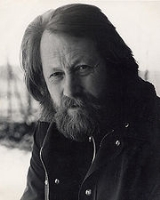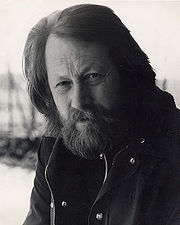
Juozas Glinskis
Encyclopedia

Lithuania
Lithuania , officially the Republic of Lithuania is a country in Northern Europe, the biggest of the three Baltic states. It is situated along the southeastern shore of the Baltic Sea, whereby to the west lie Sweden and Denmark...
n playwright.
Works
Juozas Glinskis marked a new stage in the development of Lithuanian theatre in the second half of the 20th century. He broke the traditional Lithuanian (usually a poetic drama) model, and is known as the pioneer of Lithuanian “theatre of cruelty”.The writer himself, however, calls his works “cognitive dramas”. They cross the protective boundaries of “common sense”; the play’s dramaturgic dynamics are based on shadings and manifestations of evil. In terms of style, that is a sarcastic grotesque, an anti-psychological caricature, a subconscious hysteria, and a combination of folkloric “native” motives and overshot of lyricism and romantic emotion.
“Grasos namai” and “Kingas” (directed by Jonas Jurašas in 1970 and Jonas Vaitkus
Jonas Vaitkus
Jonas Vaitkus is a lecturer, theatre and film director well known in Lithuania and throughout Europe. From 1969 to 1974 Jonas Vaitkus studied at the State Theatre, Music and Cinematography Institute of Leningrad...
in 1980) marked a turning point in the hierarchy of aesthetic values in Lithuanian theatre. These and other J. Glinskis’ plays demanded new means of expression from the Lithuanian theatre: naked passions, harsh validation of matter, superiority of metaphors, and avant-garde challenges.
J.Glinskis newest drama „Vieno Tėvo Vaikai“ (Children of One Father) received the highest Lithuanian award from the directors of the expert commission - 1000 years Lithuania
Political activism
Glinskis and his family were engaged the Lithuanian pro-independence political movement SąjūdisSajudis
Sąjūdis initially known as the Reform Movement of Lithuania, is the political organization which led the struggle for Lithuanian independence in the late 1980s and early 1990s. It was established on June 3, 1988 and was led by Vytautas Landsbergis...
, acting against the suppression of the Soviet dictatorship and has been a delegate of Sąjūdis. His 1968 soviet critical play "Pasivaikščiojimas mėnesienoje“ (A walk in the moonlight), that presented the members and leaders of the communist party as mental house inmates, was under conspiracy circumstances brought to the USA, with help by Andrei Sakharov
Andrei Sakharov
Andrei Dmitrievich Sakharov was a Soviet nuclear physicist, dissident and human rights activist. He earned renown as the designer of the Soviet Union's Third Idea, a codename for Soviet development of thermonuclear weapons. Sakharov was an advocate of civil liberties and civil reforms in the...
. It premiered at a theater in New York City.
As a political companion and friend of Vytautas Landsbergis
Vytautas Landsbergis
Professor Vytautas Landsbergis is a Lithuanian conservative politician and Member of the European Parliament. He was the first head of state of Lithuania after its independence declaration from the Soviet Union, and served as the Head of the Lithuanian Parliament Seimas...
, the first head of state of Lithuania after its declaration of independence from the Soviet Union, he wrote the biography of Landsbergis in 1990-1991, including the history of independence of Lithuania in the book „Laisvės Byla“ (File of Freedom).

